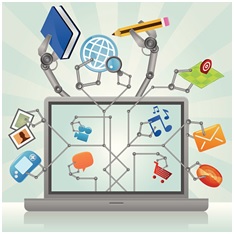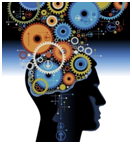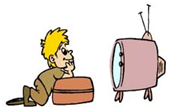By Shannon Siebert, Heartland Beat Staff Writer
 The other night I found myself happily alone in the basement manning our 65 inch TV, both remotes, Mac computer, and of course, my ever present new iPhone 6 that seems to be attached to my hand. Amazingly through the technology we enjoy today, I was watching the live streaming of the Heartland Huskies basketball game in Wilber on the computer desk adjacent to my big screen. On TV I was watching live Husker volleyball action in their first round of the NCAA playoffs as they battled a feisty Hofstra team. During breaks in the volleyball, I was switching to watch my beloved NBA team, the Nuggets, that I was taping so I could speed through any commercial breaks.
The other night I found myself happily alone in the basement manning our 65 inch TV, both remotes, Mac computer, and of course, my ever present new iPhone 6 that seems to be attached to my hand. Amazingly through the technology we enjoy today, I was watching the live streaming of the Heartland Huskies basketball game in Wilber on the computer desk adjacent to my big screen. On TV I was watching live Husker volleyball action in their first round of the NCAA playoffs as they battled a feisty Hofstra team. During breaks in the volleyball, I was switching to watch my beloved NBA team, the Nuggets, that I was taping so I could speed through any commercial breaks.
Whew! But I forgot my phone. In between all my media switching, I was texting my son Taylor who owns Striv.tv the live streaming company that was providing the Heartland/Wilber game. I was complaining to him that there was no box score visible on the screen, and it sure would help if whoever was operating the camera would just point it momentarily at the scoreboard occasionally.
It took considerable personal restraint for me NOT to check my Twitter feed during all this since I was behind in the Nuggets game and didn’t want to find out prematurely if they won or lost. My restraint went out the window when the Husker Volleyball team finally won. I sneak peaked Twitter for the ensuing victory tweets while frantically searching for any tweets with the Heartland basketball score. But wouldn’t you know, I discovered that my Nuggets lost!
For the sports junkie this kind of multi-tasking technological overload was pure delight but actually a bit exhausting which I will address later. But why is it so pleasurable and what are the neurological effects of these new habits our multiple devices have made possible?
I recently read “The Organized Mind†by Daniel J. Levitin, an in-depth study of how the brain works and how to successfully negotiate and  organize today’s information overload. “Make no mistake: E-mail, Facebook and Twitter checking constitute a neural addiction,†says Levitin.
organize today’s information overload. “Make no mistake: E-mail, Facebook and Twitter checking constitute a neural addiction,†says Levitin.
I don’t consider myself addicted, but I do check my email, Twitter, Instagram, Facebook, Snapchat, and instant messages countless times a day. What I didn’t realize until reading his book is that every time I do this, my brain receives a dose of “reward hormones†and it is the “dumb, novelty-seeking portion of the brain that induces this feeling of pleasure, not the planning, scheduling, higher-level thought centers in the prefrontal cortex,†according to Levitin.
He says to be really productive, we need to train ourselves to turn off our devices, avoid them daily for set periods of time, shut the door and generally find concentrated amounts of time to work without being disturbed or distracted. We are being fooled by our brains when we check an email or respond instantly on our devices believing that we really accomplished something. In reality, we are not engaging our pre-frontal cortex, which is where the important work is done in our brains.
So why was I exhausted after my multi-sportsfest? Multi-tasking is the culprit and before reading this book, I thought it was a high order type skill that one acquired. Not so says Levitin. Harmless as it may seem, even reading an e-mail while talking on the phone has a great metabolic cost. It takes more energy to shift your attention from task to task than just to focus on one task according to Levitin.
He explains that naturally our brains seesaw from daydreaming mode to focusing, and this is how we work. But multi-tasking disrupts this kind of sustained thought that is necessary for problem solving and creativity.
This switching back and forth rapidly from one task to another is not how our brains are wired to perform.
Studies show that multi-tasking actually produces a stress hormone which can cause overstimulation, anxiety and scrambled thinking. Processing the insane amounts of information and data our deVICES allow us today is physically exhausting. Our brains are run on neurons that require oxygen and glucose to survive, and we are pooping them out!
We may be fooled into thinking we can pay attention to multiple things, but our brains were designed to focus on one thing at a time. There are limits to what a human being can attend to. Texting and driving is just one example of how multi-tasking can go terribly wrong. Switching our attention can come at a high cost!
Haven’t you ever experienced turning down the radio while driving if you are trying to negotiate directions in heavy traffic? Or maybe you were trying out a new recipe with the TV blaring while trying to answer a question directed towards you from another room in the house only to discover that you goofed up the sequence of ingredients ruining your dish. Bad decisions and mistakes are made when we do not allow our brains to focus on the task at hand.
So are our “smart†devices really making us dumber? And more importantly what does this mean for our children and grandchildren who are over their heads in information? The answers are as complex as the technology, but we must understand that these new habits do not always engage the executive (prefrontal cortex) part of the brain. This is where problem solving, goal directed behavior, attentional focus, working memory, impulse control, self-regulation, and delay of gratification are born says Levitin.
If we want to raise successful generations, we must realize how our brains work and make adjustments while embracing technology. He cites studies that show when students watch TV and study at the same time, they end up storing information in the wrong part of their brain where it is much harder to retrieve.
 And speaking of TV, all my mother worried about was whether we watched too much of “The Three Stoogesâ€. Today there are legitimate concerns about the effects on a young toddler watching something like “SpongeBob SquarePants†that has rapid fire animation resulting in cognitive overload for the developing brain to process.
And speaking of TV, all my mother worried about was whether we watched too much of “The Three Stoogesâ€. Today there are legitimate concerns about the effects on a young toddler watching something like “SpongeBob SquarePants†that has rapid fire animation resulting in cognitive overload for the developing brain to process.
I highly recommend this book that I have only touched the surface of explaining how the brain works and the effects of technology. The author is a neuroscientist and cognitive psychologist who provides some interesting insights and practical answers about how to deal better with technology resulting in an organized mind. It’s available at the York Kilgore Library or of course, you can download it onto one of your DeVICES like I did.


































